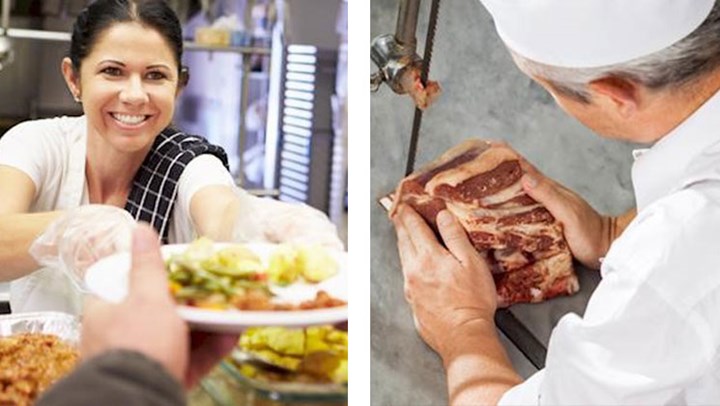
by Bruce Ingram - Sunday, May 20, 2018

One of the many ways sportsmen make society a better place is through state Hunters for the Hungry (HFH) organizations. Laura Newell-Furniss, director of the HFH program in Virginia—Virginia Hunters Who Care—has been with the organization since it began in 1991. She says the idea for the organization came from its first director and founder, the late David Horne, who had heard about a feeding program in Texas that was distributing venison.
“David, a hunter himself, knew that because of liberal bag limits, hunters could harvest more deer than they could use,” says Newell-Furniss. “So he thought why not have people donate their excess deer to an organization that could then distribute it to those less fortunate who were desperately in need of a healthy, high-protein, low-cholesterol meat source.
“That started the process of us becoming one of the first hunters for the hungry organizations in the country and now probably the largest one. We have reached 26.5 million servings [1/4 pound] of venison being provided to those in need.”
The way the Virginia organization works is typical of others around the country. The entity has a list of processors and collection sites where hunters can drop off field-dressed deer. While some processors donate portions of their services, the charity raises funds to pay them to skin, cut, wrap and freeze the meat so it is ready for distribution. This high-protein, lean meat is then given to local feeding programs such as church food pantries, the Salvation Army and food banks which then make it available to the clients they serve. Newell-Furniss says many communities have a half dozen or more local feeding programs that could benefit from having this meat donated.
Working with already established distribution systems that are doing a great job and just need more lean protein, says Newell-Furniss, is far more time and cost efficient than having HFH staff members travel across the state and distribute the venison themselves. The tremendous good that state HFH organizations and participating food banks, churches and feeding groups do cannot be underestimated.
“Venison is a healthy, high protein, low fat meat,” emphasizes Newell-Furniss. “Venison doesn’t have antibiotics or growth hormones in it—it’s the original organic meat. Many doctors recommend venison for those who have suffered from such afflictions as diabetes, cancer and heart disease.”
In working to promote the Virginia program, Newell-Furniss emphasizes another reason more hunters should consider giving meat to their state HFH organizations.
“Hunters donating venison to those in need absolutely reflects the generosity and compassion of hunters, letting those who don’t hunt know the true nature of hunters,” she says. “Hunters traditionally have shared their bounty with their friends, neighbors and the less fortunate. Now, it has never been easier to do.”
The Virginia HFH director says bestowing venison can bring great personal satisfaction as well.
“I recently delivered venison to a mother and her children,” she says. “They were living in a house that was very dilapidated with broken windows and holes in the floor. The way those kids’ eyes lit up when we came with the meat, and the way the woman, with tears in her eyes, thanked us for coming and how she said she could cook so many meals with that meat…well, that was very gratifying.”
Hunters and sportsmen groups also don’t have to donate a deer to be a part of state hunters for the hungry efforts. Newell-Furniss relates that cash or in-kind donations are welcome as well, and some processors today even collect bear meat for distribution.
“Bear have become more abundant in Virginia and other states,” she says. “Some of our processors say it’s very easy to work up a bear for distribution while others say it is very time consuming. So it’s an individual decision regarding whether a processor will accept bear meat or not.”
In any event, there’s no doubt that Virginia Hunters Who Care and other such state organizations are very thankful for the generosity of sportsmen.
“We really appreciate the hunters who donate,” she says. “They go to the effort to field-dress and deliver deer to our processors so that others can be fed. It’s wonderful to be a part of that.”
For more information, go to h4hungry.org.
■ ■ ■
Editor’s Note: In the 1990s, as part of the NRA’s public relations team, it was my honor to know Virginia Hunters Who Care founder David Horne and take him on a media tour across Virginia to help promote the Virginia program and the HFH movement. I personally have seen the difference that hunters make firsthand through participating in state-based HFH programs and volunteering to serve meals to those less fortunate. For hunters who want to get involved in their own state-based HFH program, the NRA maintains a Hunters for the Hungry Information Clearinghouse to put interested individuals in touch with programs in their area and foster public awareness through education, fundraising and publicity. For more information, call 800-492-4868 and select option No. 3, or email NRA Hunter Services at [email protected]. To view the NRA Hunters’ Leadership Forum’s HLF fact sheet, “Hunters for the Hungry: United to Help Those in Need,” click here. —Karen Mehall Phillips
E-mail your comments/questions about this site to:
[email protected]
